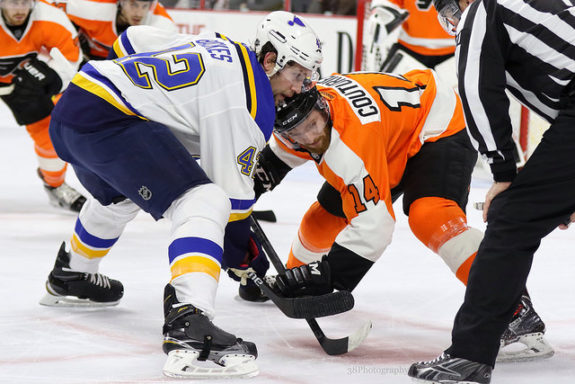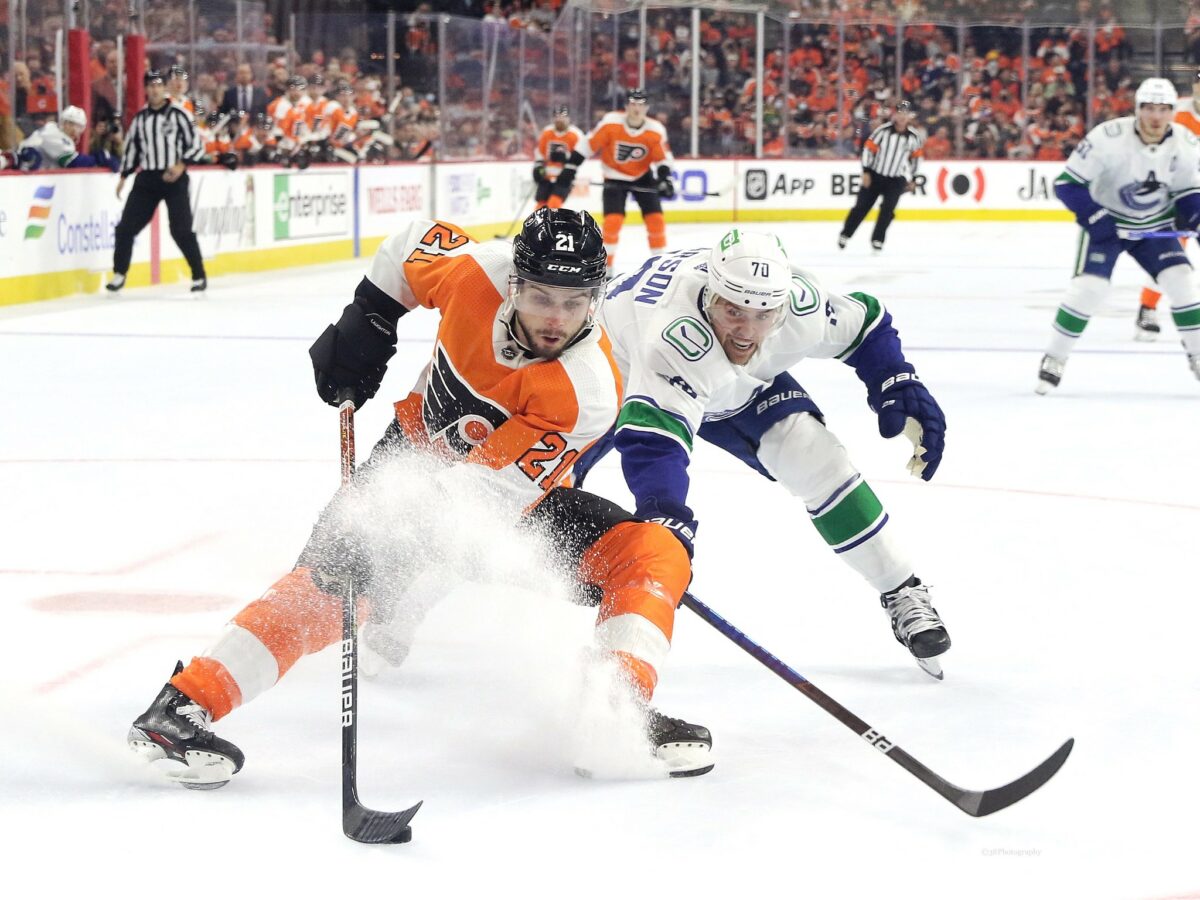The Philadelphia Flyers dealt with a devastating amount of injuries during the 2021-22 season, and the absences of key players unquestionably contributed to the disappointing outcome of a last-place finish in the Metropolitan Division. After general manager (GM) Chuck Fletcher aggressively shuffled the roster last summer, the team entered the season with the belief they could contend for a playoff spot and make noise as a Stanley Cup contender.
There was a renewed positivity within the locker room that a clean slate would help them leave the disastrous 2020-21 season behind them. The Flyers never played with their full, expected lineup, making their goals to compete incredibly lofty. The 2021-22 season went off the rails even quicker than in 2020-21.
Related: Flyers Lacking Accountability From Scott & Fletcher
Prominent members of the organization have consistently pointed to injuries as the primary root of failure when asked about the team’s inability to meet its goals. However, they should not operate under the assumption that they would’ve earned a playoff berth and met the high expectations placed on them during the preseason if they weren’t hit badly by injuries because the idea is misguided and overly optimistic. If the Flyers are going to overcome their struggles, they need to correct the lack of resiliency against factors outside of their control.
Injury Bug Hits Flyers
Philadelphia’s projected top defenseman Ryan Ellis played only four games in 2021-22. Top centers Sean Couturier and Kevin Hayes combined to play in under half of their total games, and both played through severe injuries at some points while they were on the ice. Injuries to Patrick Brown, Derick Brassard, and Nate Thompson handcuffed their depth at center. The minor-league forward depth behind them suffered also when Tanner Laczynski, Wade Allison, and Tyson Foerster, among others, went down with long-term injuries. Joel Farabee, Scott Laughton, and Rasmus Ristolainen also spent considerable time out of the lineup.
Over the entire season, the Flyers finished third from the bottom of the league in Cap Hit Injured Players (CHIP), which measures the impact of injuries by measuring the net difference in total average annual value (AAV) of players injured or out of the lineup because of illness between the two opponents in each NHL game. They trailed only the Montreal Canadiens, who played without Carey Price and Shea Weber for the majority of the season, and the Vegas Golden Knights, who played without Mark Stone, Jack Eichel, Max Pacioretty, and Robin Lehner for long stretches. They also had the third-most man games lost, a stat that had a direct correlation with the NHL standings this season.
Individuals within the organization were quick to point out the disadvantage. Dave Scott, the CEO of Comcast Spectacor, presented the wrong mentality during a January press conference which was supposed to provide a crucial evaluation at a point of turmoil within the franchise.
“If you were to ask me what our number one challenge is today, it’s injuries. It’s not an excuse. It’s our reality…I like, again, what we did going into the season. On paper, it looked really solid…Injuries happened. Again, no excuses for it, but it did happen. I think we’ve had more than anybody I’ve seen.”
-Dave Scott
The insistence that the “number one challenge” was a factor largely outside their control is in itself an excuse and a mistake in semantics by Scott. He implied that the set of challenges the Flyers faced was unique, which is not the type of attitude that suits a professional sports franchise well. Starting goaltender Carter Hart echoed the sentiment that things were going according to plan before injuries derailed the situation.
“Coming into this year, I thought we made some good moves, some good additions, and started off well, and I think just kind of got the injury bug a little bit. I don’t think we’ve really played with a full lineup all year long, besides maybe the first few games.”
The attitude reflects what Bill Meltzer referred to as a “collective mentality” of “feeling a little sorry for themselves” when faced with adversity over the past two seasons. The mentality began off the ice and crept onto the ice. The Flyers continually faltered after bad puck luck put them behind in games over the past two seasons. They allowed issues to snowball with no suitable response.
Flyers Pointed to COVID-19 Excuse in 2020-21
The Flyers faced a similar situation with undeniable challenges presented by the COVID-19 virus during the 2020-21 season. An outbreak of the virus within the locker room caused cancellations throughout the month of February 2021 and created the need for a daunting schedule in March. They crumbled against the adversity and limped to a 6-10-1 finish during the month.

Frustration got the best of them, and their continuity as a team couldn’t withstand adversity. Former head coach Alain Vigneault and his played repeatedly harped on how they couldn’t correct issues in their structure because of the lack of practice time throughout the condensed schedule.
“I need a normal season. I need people to go out and get vaccinated so that we can have a normal season next year. I’ve been here two years and we haven’t had one of those. I want guys coming into camp having trained in a normal way during the summer. I want to go through a normal camp. I want to go through a normal season that’s 82 games worth,” Vigneault said during his exit interview in May 2021.
Fletcher made substantial changes to the roster after the disappointing finish in 2020-21. He hoped to correct issues with personnel changes. However, another part of the expectation for a better season in 2021-22 was based on the assumption of a factor outside their control working itself out. The Flyers collectively believed that the world’s gradual distancing from the COVID-19 pandemic would benefit them despite the fact that every other NHL team dealt with their fair share of complications from the same worldwide issues. The emphasis on the accessibility of training facilities for players from Canada over the summer factored significantly into the optimism.

The hope that factors outside a team’s control will correct themselves is not a resilient mentality. The Flyers have not been a resilient team in recent memory, certainly over the past two seasons and not for the better part of the past decade. When COVID complications forced some players to miss games in 2021-22, members of the team again vented their frustration to the media. They were not pleased with the virus policy of the NHL, another factor outside their control, and its effect on their strategy on the ice.
The arch-rival Pittsburgh Penguins have created a directly converse identity over the past seven seasons under head coach Mike Sullivan. They have found ways to be successful whether or not their star players are in or out of the lineup by plugging available players into new roles. They have made the Stanley Cup Playoffs in 16 consecutive seasons, an NHL record, while the Flyers have missed in six of the past 10 seasons in the worst era in franchise history.
Flyers Leaders Take Accountability for Failure
The two longest-tenured Flyers spoke with more accountability and a greater understanding of the big picture during their exit interviews. Couturier, the most likely option to replace Claude Giroux as the franchise’s next captain, acknowledged the hardships without any insinuation that players like himself or any of his teammates returning from injury would instantly fix the problems the Flyers face.
“It was a tough year with injuries, but I think it’s more than that. It’s not just injuries. We still have to find a way. We can’t just put it all on the injury excuse. We still have to find a way to be more responsible, take some ownership in our mistakes, and learn from them. It seemed at times we didn’t have any growth in our game. It was just a tough year,” Couturier said.

Scott Laughton spoke with no intention of asking for a mulligan on the 2021-22 season because of the injury woes. He demonstrated the type of leadership and accountability that earned him a role as an alternate captain this season.
“Even with the injuries this year and everything, I don’t think we were playing the right way even before the injuries. We were chasing games. We didn’t play with the puck…I think every guy’s got to take a hard look at the mirror this summer and see what went wrong in their game individually to try and help the team.”
Fletcher also acknowledged a larger issue that injuries are not entirely outside the control of the organization. Three days after several players spoke about re-aggravating injuries, he mentioned “things we (the Flyers) can do from an injury prevention standpoint” concerning the medical staff and the treatment of injuries that do occur. The organization also cannot assume that Ellis, among other players injured in 2021-22, will return at full strength and allow them to forget the injury woes of the season ever happened.
If the Flyers expect to rejoin the conversation as a contender in the Metropolitan Division, they will need to correct the tendency to fade at the first sight of adversity that has plagued them over the past two seasons. The collective mentality needs to reflect the comments made by Laughton and Couturier, and other players need to move past the things that went wrong in 2021-22. The collective acceptance of failure could help the team move into a new era with proper leadership and more resiliency against adversity.